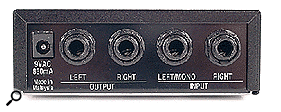Alesis show us how to cram big spaces into ever smaller boxes!
The Alesis Picoverb is barely any larger than it's own power adaptor, but it is a surprisingly ruggedly built effects box. Rather than skimp on quality, the designers have thrown many of the features we take for granted overboard, retaining 24-bit conversion and good effects algorithms. You get 16 preset effects broken down into hall reverbs (two), room reverbs (three), plates (three), chorus, flange, delay (two) chorus/room (two), voice canceller and rotary speaker. There are Input and Mix knobs, but no level metering or even a clip LED, so you need to set the input level by ear. Stereo inputs and outputs are provided on unbalanced jacks, with the provision to use the left input only for mono-in use.
 Though the effects are entirely preset, they sound surprisingly 'right', especially the reverbs, which vary in sensible steps from a very short, ambient room, through some nice-sounding plates and medium rooms well suited to drums and vocals, right up to warm hall sounds. All the reverbs have a dense, smooth decay and just the right amount of character. While they may not have the finesse of high-end studio reverbs, they're a lot better than I've heard from most budget units and generally much better than you'd hear from even one of the better host-powered reverb plug-ins.
Though the effects are entirely preset, they sound surprisingly 'right', especially the reverbs, which vary in sensible steps from a very short, ambient room, through some nice-sounding plates and medium rooms well suited to drums and vocals, right up to warm hall sounds. All the reverbs have a dense, smooth decay and just the right amount of character. While they may not have the finesse of high-end studio reverbs, they're a lot better than I've heard from most budget units and generally much better than you'd hear from even one of the better host-powered reverb plug-ins.
|
The chorus effects are also very strong, with a six-tap chorus effect plus two further chorus/reverb combinations offering slow and faster speeds. The ratio of depth to speed is well chosen in all cases and the Mix control provides some degree of control over intensity, with the effect sounding particularly good on electric guitar. There's also the obligatory flanger with a nice slow, deep sweep and just the right amount of feedback, plus a couple of delay treatments. The first is a short slapback delay, good for those old John Lennon vocal sounds or Rockabilly guitar tracks, while the second is a stereo reverb where one side is delayed by 291ms and the other by 388ms, providing a credible guitar instrumental sound.
 At preset 15 we find a vocal eliminator, which removes all mid-range sounds that are panned dead centre. On most tracks, this drops the vocal level by a significant amount, but leaves any reverb or other stereo treatments at their original level. The degree of cancellation is determined by the Mix setting. Naturally there are side-effects to this process, so while you could get away with using treated tracks for casual Karaoke backings, you couldn't use them in any serious recording context.
At preset 15 we find a vocal eliminator, which removes all mid-range sounds that are panned dead centre. On most tracks, this drops the vocal level by a significant amount, but leaves any reverb or other stereo treatments at their original level. The degree of cancellation is determined by the Mix setting. Naturally there are side-effects to this process, so while you could get away with using treated tracks for casual Karaoke backings, you couldn't use them in any serious recording context.
Finally comes a rotary speaker simulation at a fixed fast speed, which on guitar makes a credible job of replicating the guitar sound from Cream's track 'Badge'. It is also useful for treating pad sounds, organ patches and even vocals.
Overall Impression
While the Picoverb offers no user editing other than mix depth, the sound quality is good and the effect presets are well constructed. I was particularly impressed by the reverb and chorus effects, and the only feature I felt shouldn't have been left off was a peak warning LED. Computer users with multi-I/O soundcards could do worse than configure a Picoverb in a send/return loop, and of course the unit is great as a basic project studio effects box — it still offers more flexibility than the original plate reverbs!
For the UK price of a toy, you get very respectable effect quality, although you have to use the presets created for you. Just because the Picoverb is small, cheap and almost trivially simple, don't dismiss it, because it can do a seriously good job.
| |
